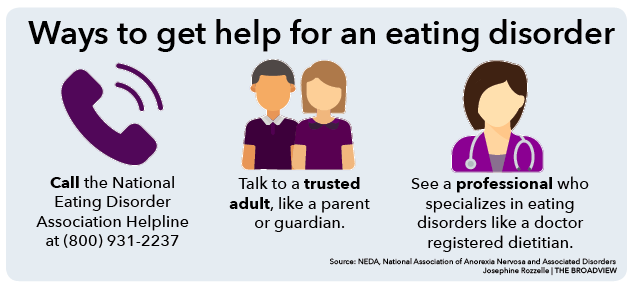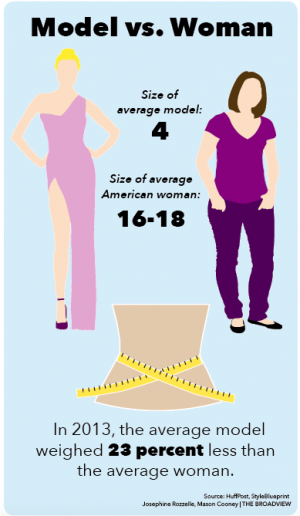Media creates self love struggles
Pressure to match beauty ideals can lead to adverse health effects
December 18, 2018
The unrealistic standards of beauty and appearance on social media platforms, entertainment programs and by celebrities may cause teenagers to struggle with self-love and can lead to mental health issues and eating disorders.
More than 70 percent of women age 18 to 30 say they do not love their bodies, according to ABC News. These insecurities develop at a young age, and more than half of girls aged 6 to 8 say they want to be thinner, according to Common Sense Media.
“I remember having a difficult relationship with my body since I was 10, however, I struggle with it now more than ever,” junior Annabelle Applegarth, who is currently managing body image disorder, said. “As people, we want to fit in, so when we see that we don’t fit the ‘norms’ portrayed around us, it is easy for teens especially to feel bad about themselves in ways they haven’t before.”
Senior Izzy Gutierrez says one of the main reasons many girls are unhappy with their appearance stems from the manner in which television and social media platforms, such as Instagram and Snapchat, portray women. Eighty-seven percent of girls 10 to 17 who act on TV shows are significantly below the average weight for their age, according to Common Sense Media.
“Social media constantly shows an ideal body with a tiny stomach and thigh gap so that people think there is only one type of beautiful,” Gutierrez, who has struggled with depression, body dysmorphia and an eating disorder, said. “I now know there is not one type of beautiful, but having media propose this idea constantly makes teens look at themselves to try to determine if they qualify as beautiful to the world.”
More than one-half of teenage girls have taken part in unhealthy dieting methods such as excessive exercise or dangerous eating habits due to dissatisfaction with their bodies, according to the Canadian Paediatric Society.
“Sadly, I see many people in my community use unhealthy coping mechanisms to deal with pain and sadness,” Gutierrez said. “From personal experience, I know that although they seem to work in the short term, these methods are harmful in the long run. If unhealthy methods are frequently used, they can lead to long-lasting mental and physical illnesses that are hard to break.”
Teenagers are especially at risk of developing destructive eating patterns. Ninety-five percent of people with eating disorders are between the ages of 12 and 25, according to the National Association of Anorexia Nervosa and Associated Disorder.
Applegarth says there are many misconceptions about the connection between body image struggles and eating disorders.
“It’s very common for individuals to assume that having body issues automatically means that someone has an eating disorder,” Applegarth said. “This is not always true. A person can dislike the way they look, wish to have a different appearance or struggle to obtain self-love, but their relationship towards food looks different compared to those struggling with an eating disorder.”
The Convent & Stuart Hall community has addressed these common mental health issues with the aim of promoting self-love and school support through clubs like Bring Change 2 Mind, a group that works to prompt conversations and brings awareness to mental health issues, according to K-12 Director of Student Support Annie Egan.
“We have taken steps like having members of our Bring Change 2 Mind chapter share personal experiences or bringing in a variety of speakers to discuss the theme of body positivity to instill a love for yourself,” Egan said. “Increasing the general awareness of these issues leads people to ask more questions and offer concerns for their community.”
Community support systems made up of trusted adults help individuals struggling with body image avoid turning to unhealthy coping mechanisms, according to Gutierrez.
“These experiences are usually like a roller coaster ride,” Gutierrez said. “Every ride is different and it is never a linear and easy ride, so finding trusted adults and professionals is important.”
Some students at Convent & Stuart Hall are actively trying to reduce the misunderstandings of mental health and self-love issues through clubs like BC2M and through involvement with organizations like the National Eating Disorders Association.
“I recently attended the NEDA Walk, which is a walk to help end the stigma and raise awareness towards eating disorders and mental health,” Applegarth said. “During the walk, my team and I created signs to help spread different messages pertaining to BMI, the diet culture and other related topics.”
Egan says the student and faculty effort to bring awareness is unique at Convent & Stuart Hall and that the school strives to be an all-accepting and supportive community.
“The mindset here at school of ‘come as you are and you’ll be treated with great care’ makes it a healthier place,” Egan said. “This mindset means we do not want you to conform or look like somebody else. It means that you, in your body and your mind, are good enough and are worthy of just as much love and attention and care as anybody else.”
Applegarth says the most valuable assistance anyone can get who lacks self-love or struggles with body dysmorphia — a disorder diagnosed to those who think about real or perceived flaws constantly — is support from friends, family and other trusted adults such as doctors.
“If a person is struggling with their relationship with their body, the most important and helpful thing they can do is ask for support,” Applegarth said. “It’s easy to feel alone in this struggle, but chances are, there are plenty of people who are in the same boat.”













Diwakar • Dec 13, 2020 at 11:48 am
This post is very helpful for me thanks for sharing the great article